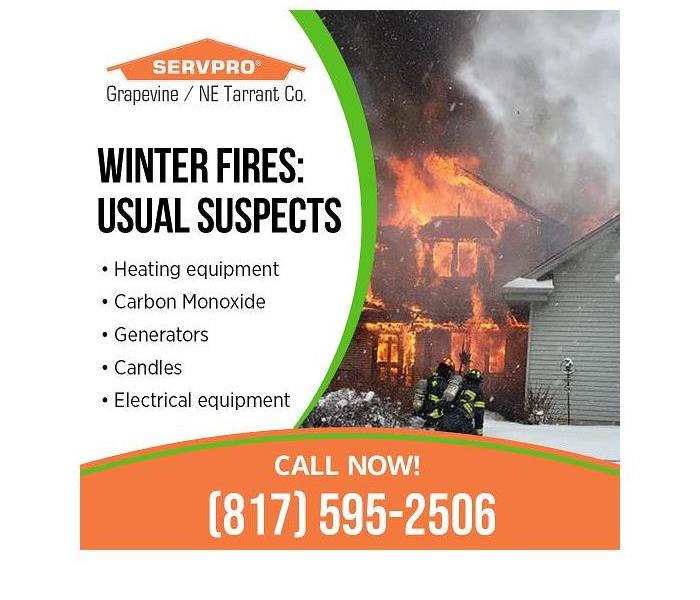What are the common causes of home fires in winters?
11/16/2021 (Permalink)
Blog summary: The SERVPRO blog explains the common causes of winter fires that homeowners must watch out for.
Winter fires: Usual suspects
As the winters and the holiday season arrives, fire safety becomes an important issue. During this time, there is an increased risk of fires and other hazards, including carbon monoxide and electrical fires. SERVPRO, a fire damage restoration company, discusses the various causes of winter fires that homeowners must watch out for.
Heating equipment
Heating is the second leading cause of US home fires and home fire injuries and the third leading cause of home fire deaths. The winter months of December, January, and February are when fires peak in the country. These fires can spark when a heater is too close to combustible materials or when the device malfunctions mechanically or electrically. Space heaters account for more than two of every five fires (44%), as well as the vast majority of deaths and injuries in home fires caused by heating equipment.
Turn off space heaters before leaving a room and make sure space heaters have at least three feet of clearance from everything in the house.
Furnaces need a special mention here. To avoid chimney fires, a qualified professional should inspect the chimney and vents every year. The cooled ashes from the fireplace must be stored tightly covered in a metal container and the container should be placed outside, at least 10 feet away from the house and any other buildings. The fireplace must be cleared of anything that might catch flame, and should never be left with fire, unattended.
Carbon Monoxide
Carbon monoxide is an odorless, colorless gas created that builds up in enclosed or partially closed spaces by burning fuel such as gas, wood, and propane in various appliances and machines. These appliances include stoves, fireplaces, gas ranges, lawnmowers, electric generators, cars, and more. Installing a CO detector and regular inspection of all heating appliances is recommended to protect from carbon monoxide poisoning.
Generators
Portable generators are indispensable when power outages occur during winter storms. However, the improper use of portable generators can lead to dangers such as carbon monoxide (CO) poisoning, electrical shock or electrocution, and fire hazards. Statistics show that half of the generator-related deaths happened in the four coldest months of the year, November through February.
- Candles
The holiday season brings in a lot of candle burning with December being the peak time. Each year between 2013-2017, an average of 7,900 home candle fires were reported each year. Homeowners must never leave candles unattended, and make sure they’re in a safe place where they can’t be tipped over. Candles must be extinguished before going to bed.
Electrical equipment
Electrical home fires are the leading cause of home fires in the U.S. Almost half of all home electrical fires were caused by electrical distribution or lighting equipment, while the other half involved other known types of equipment like washer or dryer fans and portable or stationary space heaters. Don’t overload electrical outlets or run extension cords under carpets, across doorways, or near heaters.
Why SERVPRO?
- SERVPRO uses state-of-the-art equipment to bring the damaged property back to its original state. SERVPRO of Grapevine / NE Tarrant County is constantly updating its fleet and equipment so clients in Southlake, Grapevine, Keller, or anywhere else can quickly access the services.
- With over 1,700 US and Canadian Franchise locations, SERVPRO is strategically positioned to respond faster to an emergency of any magnitude.
- The SERVPRO staff is highly trained in property damage restoration. They receive initial in-house training and constant skill up-gradation at the corporate training facility and also acquire the regular IICRC-industry certification.
For fire damage restoration, call SERVPRO of Grapevine / NE Tarrant County today at (817) 595-2506 or e-mail at office@SERVPROheb.com






 24/7 Emergency Service
24/7 Emergency Service
